Final report for WSP18-001
Project Information
Conference training and educational topics are developed with the input of an active and interested advisory committee. This SARE PDP grant will enable the cosponsoring of additional conferences and workshops/trainings with partners and collaborators. Additionally, funds will be used to maintain an Alaska SARE listserv, printed materials, Zoom meeting platform, and Alaska webinar/newsletter which is integral for connecting hundreds of Alaskans with innovations and information regarding sustainable agriculture. The Alaska SARE webinar and newsletter platform is dedicated towards sustainable farming operations, research, and projects occurring around the state and abroad. Lastly, the PDP grant funds will also support the state WSARE state coordinator to travel to the annual WSARE PDP summer meeting.
The topics that will be highlighted at the Annual Alaska Sustainable Agriculture Conferences and Alaska PDP Trainings/Workshops include: 1) sustainable soil and crop management, 2) sustainable poultry and livestock management, 3) integrated pest management, plant disease, and crop nutritional deficiencies, 4) water quality, crop irrigation, natural resources, and fish/wildlife habitat, 5) composting and fertilizer management, and 6) agricultural business management. Farm health and safety, farm business diversification, integrated pest management, as well as agricultural business management and economics will be emphasized, since this information is crucial for beginning farmers and ranchers, as well as maintaining agriculture businesses across Alaska. Since interest in the production and management of reindeer has been increasing within the state, livestock management aspects of the conference will be aimed at further developing the reindeer industry within Alaska.
1) Increase the knowledge of agricultural professionals about sustainable agriculture practices and achievable goals that they can adapt and implement in Alaska,
2) Increase the emphasis on sustainable agriculture practices that agricultural
professionals incorporate into educational programs and publications,
3) Facilitate the transmission of knowledge of sustainable agriculture principles from agricultural professionals to agricultural producers, and
4) Promote the adoption of sustainable agricultural practices by agricultural producers and assist them in developing the skills necessary to make these practices successful.
Advisors
Education
The Alaska SARE PDP is part of the Agriculture and Horticulture Department of the School of Natural Resources and Extension at the University of Alaska Fairbanks. Along with SARE, we include programs in commercial agriculture/horticulture, integrated pest management, pesticide safety, and plant diagnostics. Other partners include the USDA NRCS, Soil and Water Conservation Districts, and Alaska Division of Agriculture.
Due to the long distances between communities and limited number of extension agents in Alaska, the SARE program is used to build partnerships, collaborations, and linkages with other agricultural groups as well as educate agriculture professionals. We frequently do this by using SARE funds to cosponsor existing agricultural conferences and workshops.
Education & Outreach Initiatives
Host the Annual Alaska Host the Annual Alaska Sustainable Agriculture Conference.
Provide a 3-day Sustainable Agriculture Conference.
Participants will gain or increase knowledge, skills, awareness about sustainable ag topics, systems, principles, technologies, practices and resources.
Participants will gain or increase motivations and skills to effectively educate farmers and ranchers about sustainable agriculture.
Participants use information learned to conduct educational programs about sustainable agriculture topics, systems, principles, practices, technologies, and resources.
Participants use information learned to incorporate information into products and educational tools.
Participants use information learned to share project materials and/or SARE and other sustainable ag resources with farmers and others.
Participants use information learned to develop and/or strengthen professional collaborations and involvement in teaching, research and demonstration of sustainable agriculture topics, systems, principles, and practices.
Participants adopt sustainable systems, approaches and practices.
Provide workshops focused on sustainable agriculture.
Will provide workshops focused on sustainable agriculture.
Participants will gain or increase knowledge, skills, awareness about sustainable ag topics, systems, principles, technologies, practices and resources.
Participants will gain or increase motivations and skills to effectively educate farmers and ranchers about sustainable agriculture.
Participants use information learned to conduct educational programs about sustainable agriculture topics, systems, principles, practices, technologies, and resources.
Participants use information learned to incorporate information into products and educational tools.
Participants use information learned to share project materials and/or SARE and other sustainable ag resources with farmers and others.
Participants use information learned to develop and/or strengthen professional collaborations and involvement in teaching, research and demonstration of sustainable agriculture topics, systems, principles, and practices.
Participants adopt sustainable systems, approaches and practices.
Provide webinars/newsletter focused on sustainable agriculture.
Will provide webinars/newsletter focused on sustainable agriculture.
Participants will gain or increase knowledge, skills, awareness about sustainable ag topics, systems, principles, technologies, practices and resources.
Participants will gain or increase motivations and skills to effectively educate farmers and ranchers about sustainable agriculture.
Participants use information learned to conduct educational programs about sustainable agriculture topics, systems, principles, practices, technologies, and resources.
Participants use information learned to incorporate information into products and educational tools.
Participants use information learned to share project materials and/or SARE and other sustainable ag resources with farmers and others.
Participants use information learned to develop and/or strengthen professional collaborations and involvement in teaching, research and demonstration of sustainable agriculture topics, systems, principles, and practices.
Participants adopt sustainable systems, approaches and practices.
Host and provide access online to conference/workshop presentations and recorded webinars.
Will host and provide access online to conference/workshop presentations and recorded webinars.
Participants will gain or increase knowledge, skills, awareness about sustainable ag topics, systems, principles, technologies, practices and resources.
Participants will gain or increase motivations and skills to effectively educate farmers and ranchers about sustainable agriculture.
Participants use information learned to conduct educational programs about sustainable agriculture topics, systems, principles, practices, technologies, and resources.
Participants use information learned to incorporate information into products and educational tools.
Participants use information learned to share project materials and/or SARE and other sustainable ag resources with farmers and others.
Participants use information learned to develop and/or strengthen professional collaborations and involvement in teaching, research and demonstration of sustainable agriculture topics, systems, principles, and practices.
Participants adopt sustainable systems, approaches and practices.
Educational & Outreach Activities
Participation Summary:
Learning Outcomes
Project Outcomes
In February of 2020, we held the 15th Alaska Sustainable Agriculture Conference that hosted speakers from all over Alaska, including speakers from the lower 48. This three day conference featured a plenary session with multiple concurrent breakout sessions. Presentations included: Overview of Western SARE Grant Programs, Alaska Farm Bureau Update, Agriculture Statistics for Alaska, Climate of Alaska, Alaska Division of Agriculture Update, Alaska Plant Materials Center Update, Update from the Alaska Food Policy Council, Alaska Farmland Trust, Alaska’s Produce Safety Program, NRCS Farm Bill Programs, USDA Farm Service Agency Update, Takeaways from Recent Alaska Soil Health Research, How Western SARE Helped Potato Farmers on the Kenai, What’s New with the Alaska Potato Program, Cover Crops in Peony and Nitrogen Release from Various Sources of Organic Inputs, Welcome and Resources for Rural Farmers, Alaska Food Security as a Long-term Vision, Getting Indoor Agriculture/Hydroponics Established in Alaska Off-Road Communities, Developing a Network of Small, Community-Based Farms in the Kodiak Region —Successes and Challenges, Agriculture and Community Food Trends in Southeast Alaska, Food Preservation Basics, Starting a Cottage Food Business, Alaska Earthworms: What to Know, Beyond Compost—There are Other Ways to Build Your Humus, Risk and Risk Management for Agricultural Producers, Before You Start a Peony Farm, Try it Out — Lease, Work for or Market for an Existing Peony Farm, When Innovation is Not a Choice, Rhodiola rosea as a Commercial Venture, Extending the Growing Season and Maximizing the Production of Rhodiola, High Altitude Organic Farming of Rhodiola Rosea, Year Two: Starting a Rhodiola Farm, What Grows Well Where? Using a Mobile App Called Grow&Tell and Vegetable Variety Trials to Answer This Question, Ag in the Liberal Arts: the Louise Way, What to Know About Importing and Exporting Livestock in Alaska, Nutritional Quality of Locally Grown Alaska Produce, Making the Most of the Alaska Pest ID App, The Alaska Weed-Free Forage Program in Alaska, Land Clearing, Timber Harvesting, Timber Sale Contracts: Before the Harvest, From Seed to Harvest — Identifying the Basic Agricultural Determinants of Successful Rhodiola rosea Cultivation in Alaska, Rhodiola Diseases and Management, Methods in Accelerating Growth and Yield of Rhodiola rosea, Taking the Rhodiola Industry from Good to Great, Livestock Parasite Management, Livestock Parasite Management Worksheet, Livestock Nutrition and Feeding, Pasture Management, and Non-Timber Forest Products: A Shoulder Season Opportunity. The Sustainable Agriculture in Rural and Off-Road Alaska session was offered as a dual face-to-face and distance education event (webinar). The conference was featured in an evening television newscast in Anchorage, Alaska's largest metropolitan area. At the time, this was the largest gathering of presentations and topics with content featuring sustainable agriculture that had ever been offered at a single Alaska agriculture conference, in addition to providing some of the content at a distance utilizing Zoom. Due to the success of this conference, the Alaska Farm Bureau has collaborated with this Western SARE program to create the first ever Alaska Farm Convention and Tradeshow. The conference agenda and abstracts are attached.
Alaska's needs for information on livestock husbandry and basic knowledge to support agriculture and 4-H livestock programs has been growing. In coordination with Colorado State University Extension, we were also able to support and organize a face-to-face and online Livestock Feeding, Nutrition, and Artificial Insemination Seminar/Webinar in Palmer as well as two days of Alaska Livestock Judges’ Training in Palmer and Soldotna. These events allowed for the development and coordination of professional relationships in the state that continue to improve agriculture and livestock operations today. These programs reached youth as well as the typical livestock producer audience common in educational events. Photos and fliers of the events attached.
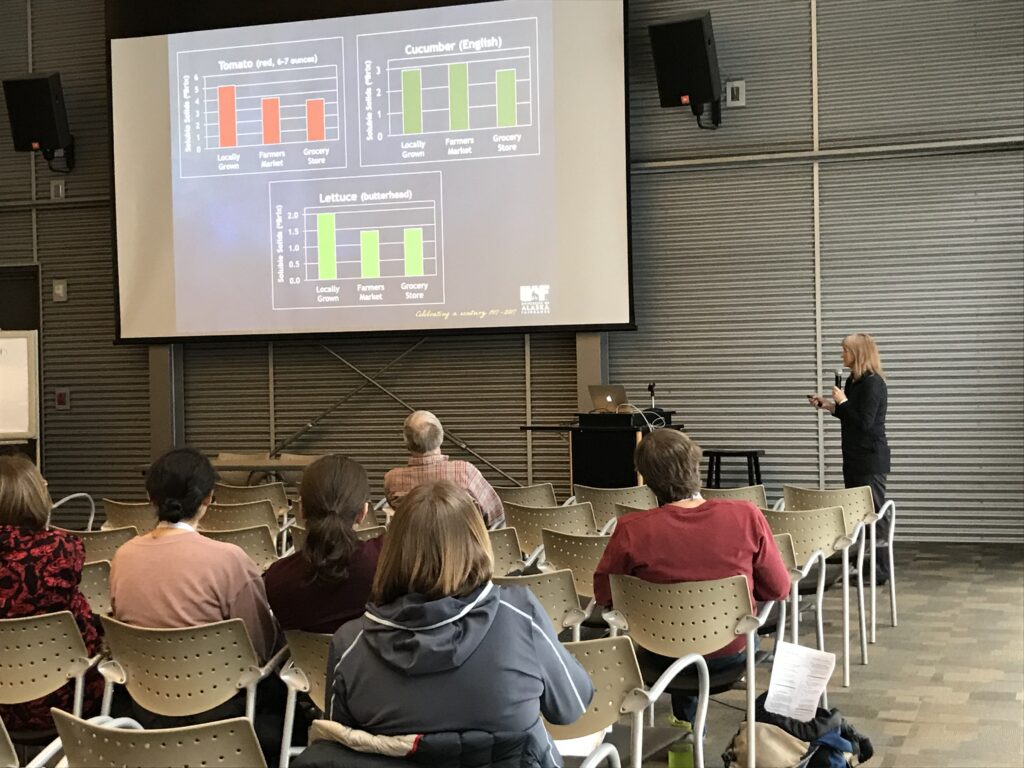
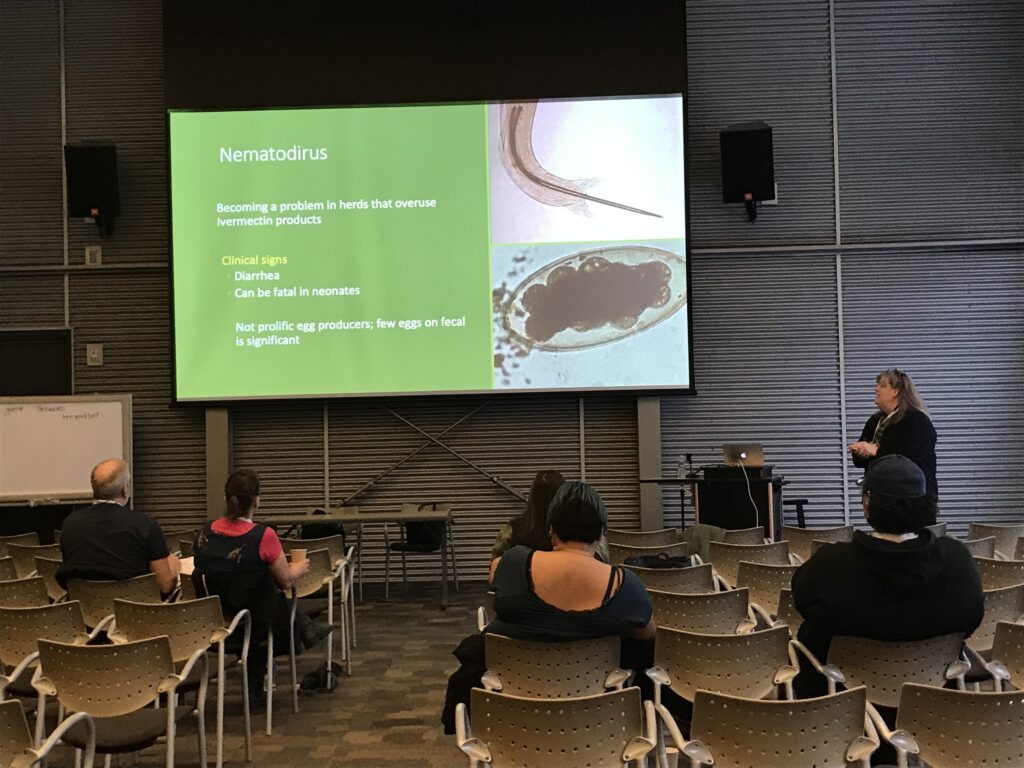
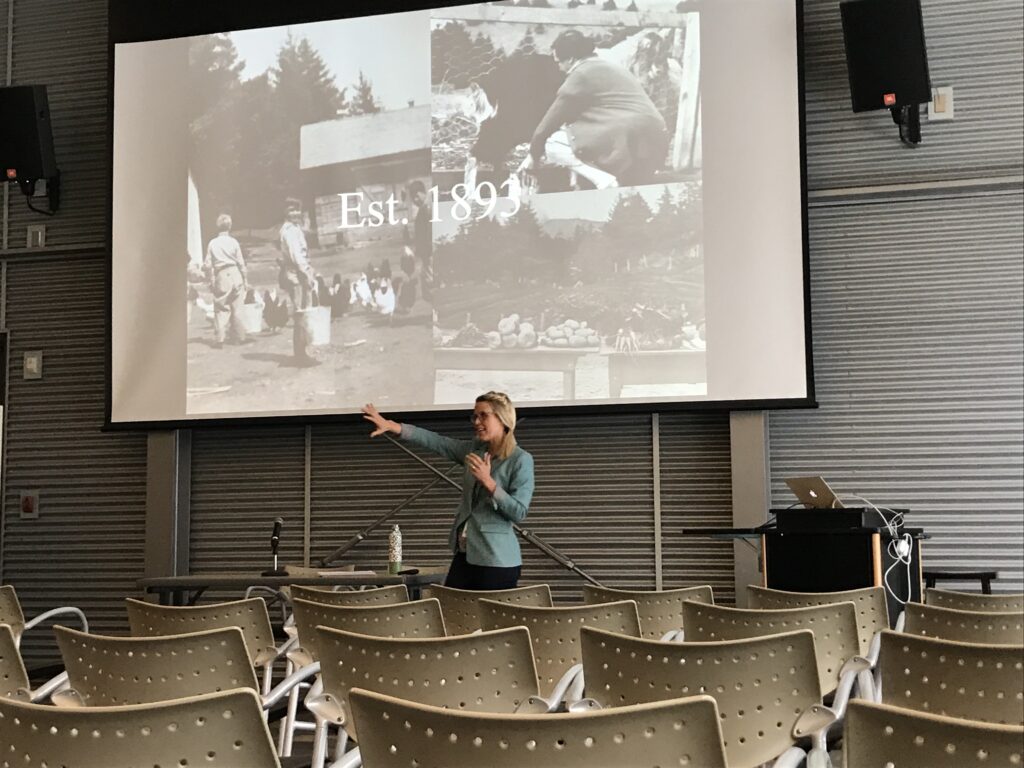
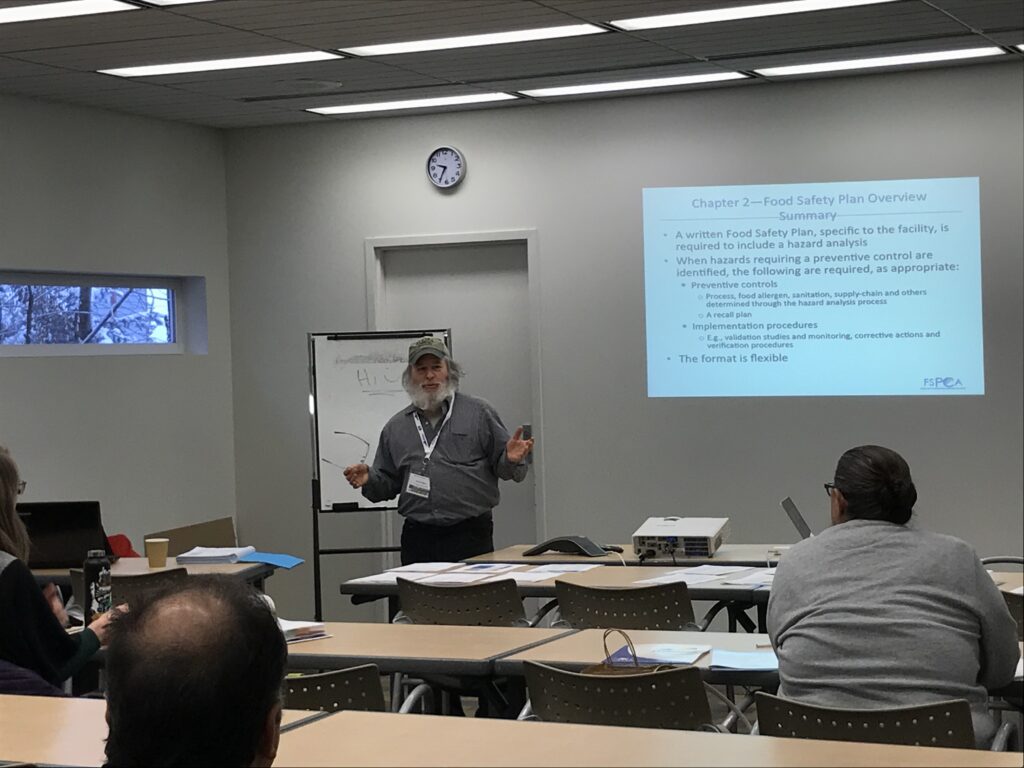
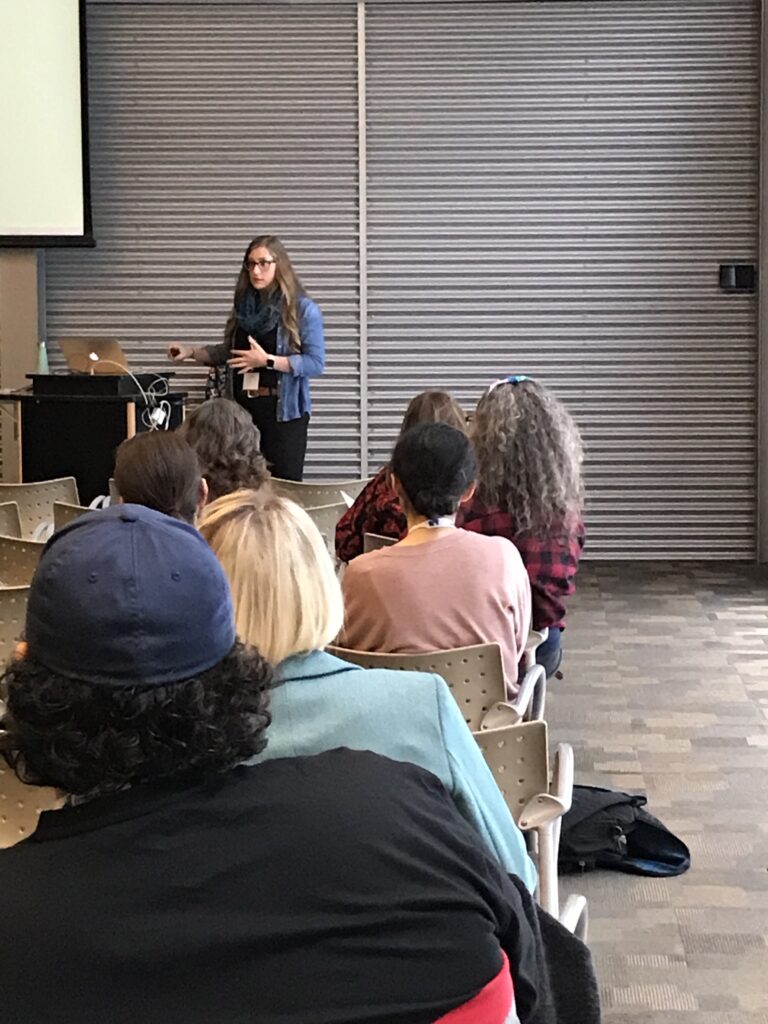
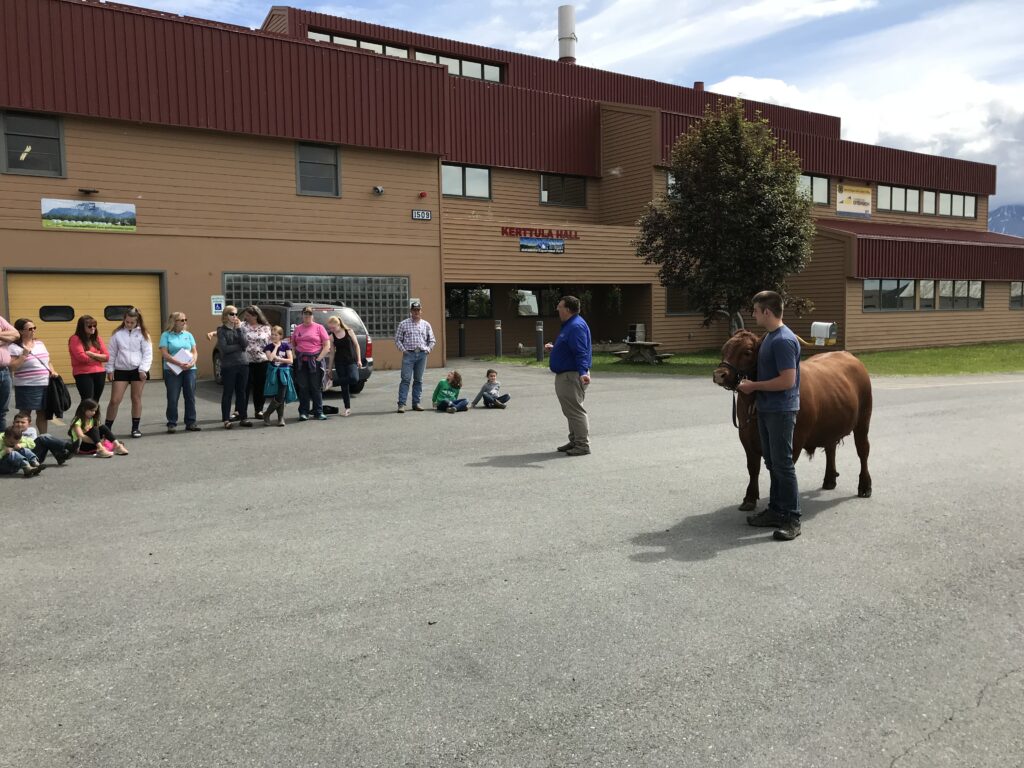
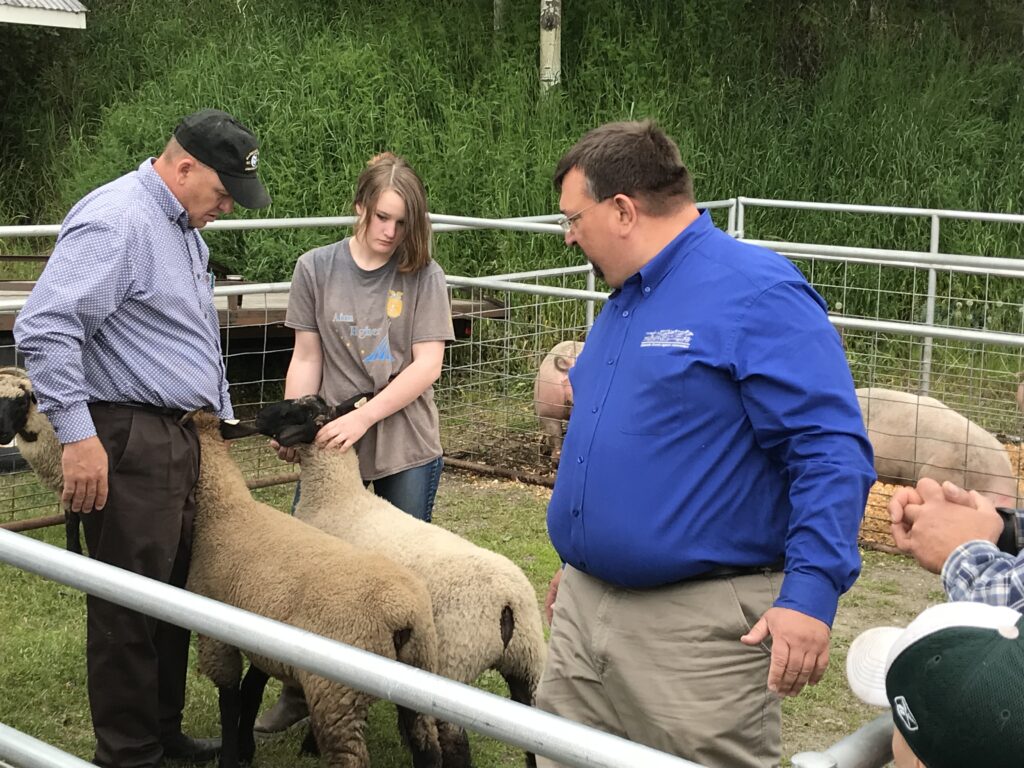
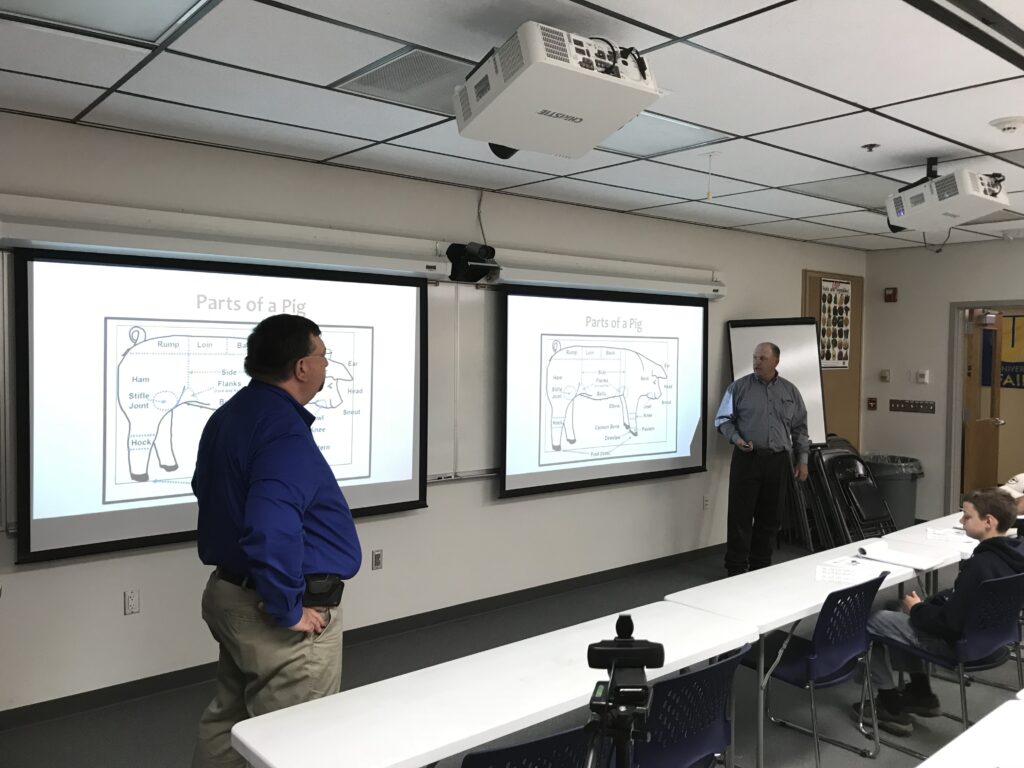
Michael Fisher and Travis Taylor from Colorado State University Extension instruct the Alaska Livestock Judges' Training for Adults and Youth at the Matanuska Experiment Farm in 2018.
Livestock seminar 6-30-18 Livestock seminar 6-29-18 Livestock seminar 6-28-18 2020 Conf. Agenda Final 3.11.20 2020 Sustainable Ag Conference Abstracts
The Sustainable Agriculture Conference that occurred from February 20 to 22, 2020 was featured in the Friday (Feb. 21) evening newscast on KTVA.
Face of SARE
Outreach is coordinated through our University Website as well as Cooperative Extension Service Offices and Statewide Agency Offices. We also release information through our list serves, websites, and social media pages across state agency and University offices.
The Sustainable Agriculture Conference that occurred from February 20 to 22, 2020 was featured in the Friday (Feb. 21) evening newscast on KTVA. A recorded video of this Newscast can be found in the Success Story Section of this report.